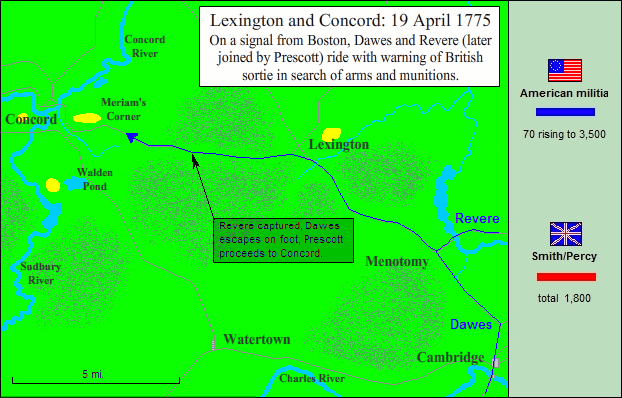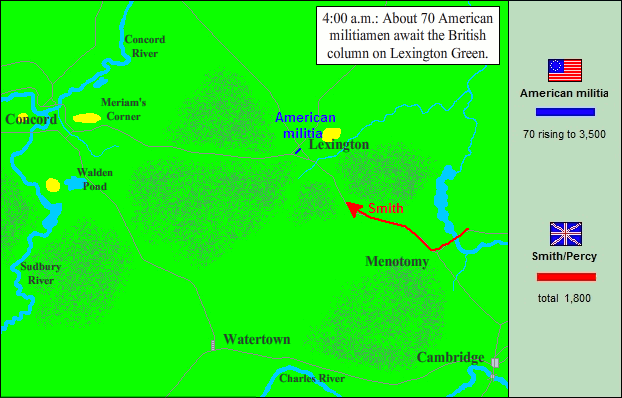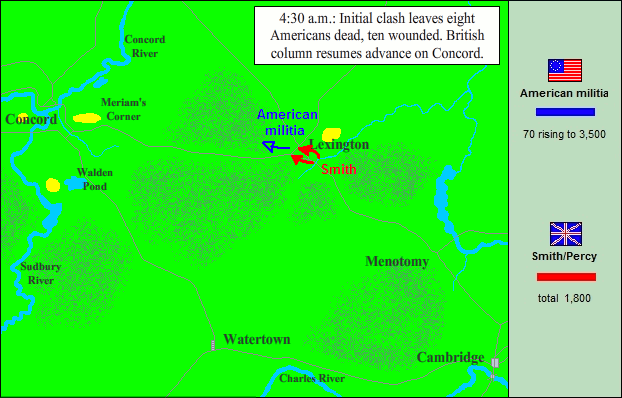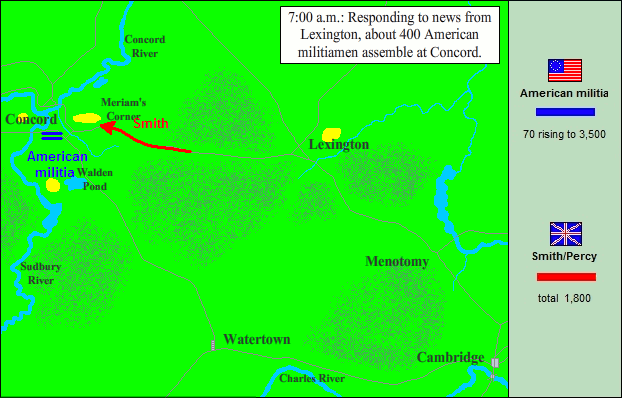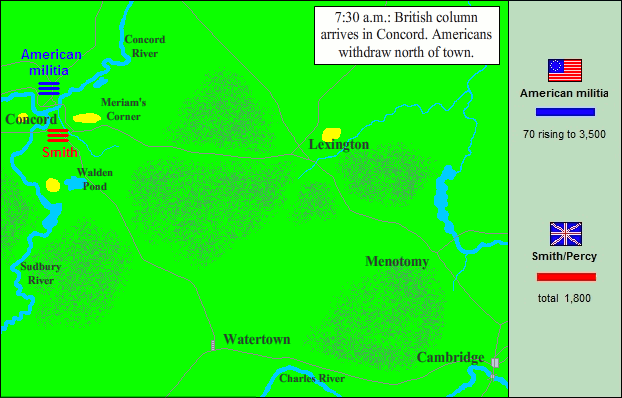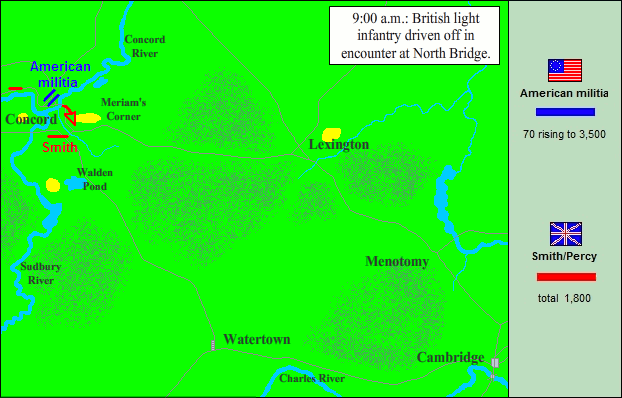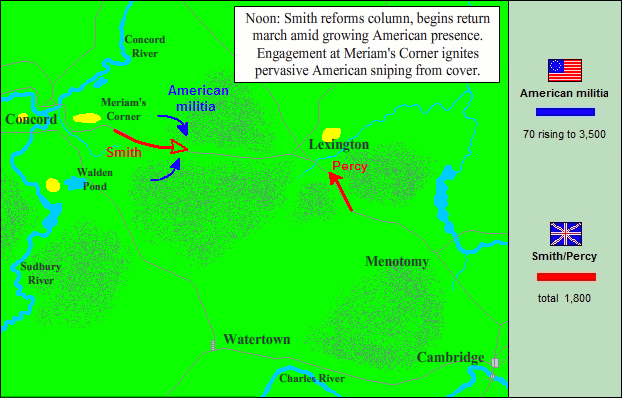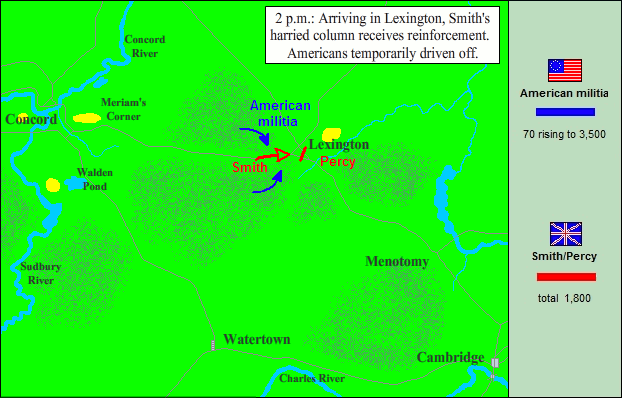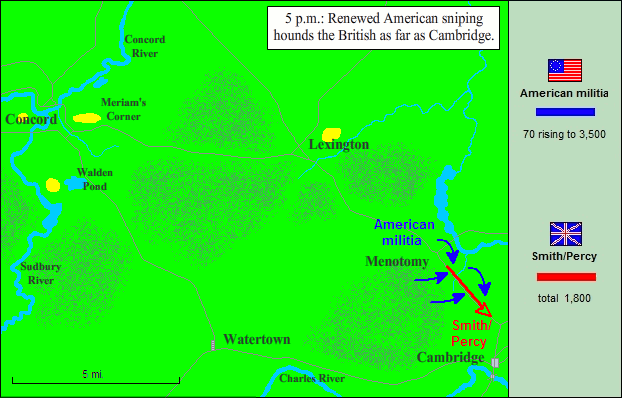Whoever looks upon [the Americans] as an irregular mob will be much mistaken. They have men amongst them who know very well what they are about, having been employed as rangers against the Indians.
–Lord Percy
While muskets flared across North Bridge, in nearby Concord, Smith, in response to Laurie’s urgent request, had decided to send a detachment of grenadiers to his aid. As Lieutenant John Barker later confided to his diary: “The Colonel ordered 2 or 3 companies, but put himself at their head, by which means he stopt ’em from being on time, for being a very fat heavy man he would not have reached the bridge in half an hour, tho’ it was not half a mile to it.” The detachment was in time, however, to run into the wash of Laurie’s disordered retreat and advanced toward the Americans, who were themselves utterly disordered. At the sight of the advancing, bear-hatted grenadiers, the Americans halted, considered, then withdrew in two bodies, one back across the bridge to the slope of Punkatasset and the other to the high ground east of the road. While the militiamen were surging over the North Bridge and back again, Parsons’ three companies of light infantry were still searching Barrett’s farm and understandably alarmed by the rattle of musketry off to their east. Having discovered nothing of value at Barrett’s, they stepped out and reached the bridge about eleven o’clock. Under the muzzles of hundreds of American muskets, three companies of his majesty’s troops, not a hundred in all, were there for the taking. But confusion in the American camp enabled the redcoats to slip across the river unmolested and start for Concord. The sight of three comrades crumpled like so many scarlet bundles near the bridge, however, inspired both horror and speed. One appeared to have had the top of his head cut off, and by the time the grim report reached the town, the soldier had been “scalped, his head much mangled, and his ears cut off, tho’ not quite dead.” Unknowingly, the country youth who struck the clumsy hatchet-blow, himself no doubt much terrified, had helped spread panic before him.
It was noon before Smith loaded his wounded into horse-drawn “chairs” (a kind of light carriage) and concentrated his whole command for the march to Boston twenty-two miles away. Smith sent the light infantry up that long, low ridge parallel to the Lexington road to cover what was now the left flank of the British line of march, while the grenadiers, the wounded among them, started down the road in column. At Meriam’s Corner, the light infantrymen climbed down once more to file in behind the grenadiers, and the whole column began to jam up waiting for the chairs bearing the wounded to cross a narrow bridge ahead. Here the long agony for the British began in earnest. For the Americans, both those who had fought at the bridge and hundreds more were posted in the woods on both flanks and in the road directly in their rear. Odd shots were already whistling into the redcoats as the column got moving again and over the bridge. As the last of the light infantry crossed, it faced about and fired a volley down the road and tumbled several Americans. The Americans responded not with a volley exactly, but with a heavy, sustained ripping of musketry from the road and woods. Several redcoats were hit and staggered on. Two fell in the road and that was as close as they would ever get to Boston.
From stone walls and trees, houses and outbuildings now came what one Regular remembered as “a Veritable Furnass of Musquetry.” The Americans were not well-organized, but no matter: there were a lot of them, all converging on this road since Revere and Dawes first roused the sleeping countryside the night before. Even Parker and some of the Lexington men were here for another crack at the redcoats. Ensign de Berniere, the erstwhile spy, reckoned there “could not be less than 5,000” of them. They fired, slipped away, rammed home another cartridge, then stepped up and fired again, taking every advantage of the cover while a column of 700 men passed unprotected along the road. Not only was the fire increasingly destructive, it was maddening to Regulars drilled to make a stand-up fight in line of battle. These Americans seemed to Lieutenant Sutherland mere “concealed villains” who made “cowardly disposition… to murder us all.” And if not murder exactly, it was murderous enough. At the same time, the Americans gave the redcoats few targets to turn on in their own defense. Musketballs flew from every point of the compass, but the British saw little more than running forms and powder smoke. Smith did what he could under the circumstances and sent out platoons of flankers to drive the enemy off. When these detachments were able to drive numbers of Americans against the Regulars on the road, they were brutally effective, and the tawny April woods were splashed with blood. It was one thing, the militiamen learned to their grief, to shoot a redcoat from ambush; quite another to confront him at the point of a bayonet. For the most part, though, redcoats banged away to little effect, were shot while they tried to reload or press on, and filled the narrow road with their dead and wounded. It was not really a march any longer or even a retreat, but an advance to the rear under a galling fire.
Thus Smith’s column staggered toward Lexington. The only good fortune Smith (limping himself with a nasty leg wound) could count at this point was that the Americans, though many and fiercely determined, were under no particular direction. It was in essence the old militia turned out, every man his own general, every company its own army. Had the militiamen managed to get across Smith’s line of march in any strength and halt the head of the column, twenty-one companies of his majesty’s elite might well have been annihilated or captured in a body. As one British officer later admitted, we “were so fatigued that we could not keep flankering parties out, so that we must soon have laid down our arms or been picked off by the Rebels at their pleasure.” As it was, by two o’clock the redcoat column, beset flanks and rear and low on ammunition, was in danger of coming completely unraveled. In the neighborhood of Fiske’s Hill, still nearly a mile from Lexington, the head of the column did in fact break into a wild rush down the road. Pitcairn, trying to ride ahead to stem the rout, lost his mount and a pair of fine pistols in the tumult of running redcoats and American musketry. A handful of officers, though, did achieve what the Americans never did on April 19: they got across the path of desperate men and halted them at the point of their own fusils (shortened versions of the regulation musket). Thus chastened, the Regulars reformed, and the column went stumbling, sweating, and bleeding on toward the scene of the morning’s fleeting success.
Such salvation as the redcoats would see this side of Boston was in fact awaiting them: Lord Percy and the First Brigade. As Smith’s column reached Lexington about two-thirty, they could see on a grassy knoll beyond the meeting house eight hundred muskets drawn up in a sturdy square. On each side of the road stood a six-pound cannon at the ready. Dazed, cheering, desperate, grateful men passed through the ranks of the First Brigade and fell in exhausted heaps near Monroe’s Tavern. One witness remembered them panting in the heat, “their tongues hanging out of their mouths, like those of dogs after a chase.” Percy’s rather tardy arrival here was just another piece of the general lack of expedition in the whole enterprise. General Gage back in Boston had made up his mind to send the First Brigade to Smith’s support as early as three o’clock last night, and orders went out directly to the brigade major to muster its four regiments on the Common at four and march at once for Concord. These orders fell through the cracks of the command system, however, and when, at five, a rider on a lathered horse arrived from Smith asking for the First, the orders to muster and march went out again. By six o’clock the 4th, 23rd, and 47th Regiments were at last on the Common in marching kit, waiting patiently for the arrival of the First Marine Battalion. And they would continue to wait, since no one remembered that the orders to muster the Marines had gone to its commander, and that officer, John Pitcairn, had been on the road all night long with the light infantry. It was nearly nine o’clock before Percy got matters sorted out and the First Brigade, minus its flank companies already with Smith, started across Boston Neck to his support. The fact that the planks of the Great Bridge at Cambridge had been pulled up might have alerted Lord Percy to trouble ahead, but it wasn’t until nearly two that a wounded man from Smith reached him with news of the running battle ahead.
Percy had been wise to bring the two six-pounders of the Royal Artillery along. As Smith’s played-out men came in through his ranks, Americans behind them swarmed across Lexington Green and up the road. Two rounds from each gun, however, scattered them in short order. At this point, Percy may have regretted not bringing the wagon carrying the extra ammunition. The Americans were certainly keeping a respectful distance from the guns, at least for the moment, but the British had just twenty-two rounds left now. Fifteen miles of road lay ahead, and, Percy guessed, ten thousand Americans behind. In an hour, another ten thousand could well be at hand. If the militiamen brought guns of their own up as well, Percy would simply have joined Smith in disaster and disgrace. While Percy’s square and the two six-pounders held the fort, the Regulars rested and attended to their wounded as best they could. Percy conferred briefly with Smith and Pitcairn, but the most junior subaltern could make this command decision: it was either march for Boston or capitulate here on the green where the trouble had started.
At three-thirty Smith’s men formed up in column again to take the lead; the relatively fresh four regiments of First Brigade fell in behind. From the relief force, Percy sent out flankers to clear as best they could the line of march. The 23rd, the Royal Welsh Fusiliers, took up the unenviable position of rearguard, though each regiment would have its turn there before the day was done. Not far from Lexington the pop and sputter of musket fire picked up again as the redcoats trudged with their wounded down the gauntlet that was now the road to Menotomy. Again from New England’s ubiquitous stone walls, from patches of wood, from empty houses, the militiamen kept up the running battle. If anything, the fighting turned more savage as the day wore on. Squads of redcoats rushed into houses along the way and, maddened by their own misery, did not discriminate too nicely between combatants and non-combatants. These Americans after all fought like Indians and were not above scalping a hapless soldier. Certainly, some Americans who took no part in the fighting died with those who did. If there was a fire in the hearth, the house generally went up in flames, often plundered as it burned. Later, atrocity tales from both parties had their origins in actual events along this road. Meanwhile, Percy managed his forces effectively and drove the Americans off as best he could. Men fell and had to be left, but he kept his column moving steadily toward Boston.
On the American side, such control of the battle as would be exerted–or at least attempted–came from Dr. Warren and General William Heath of the Massachusetts militia, both of whom hurried on to Menotomy late in the afternoon along with companies from Roxbury, Brookline, Dorchester, and Danvers. There, near the Foot of the Rocks, the militiamen made their most determined effort to halt the redcoat column and crush what was virtually half of Gage’s North American command. But Percy, whose leadership throughout was cool-headed and effective, sent detachments out to press both flanks of the militia and brought up his six-pounders. For a time the fighting blew up fiercely and at close quarters: in places the redcoats went in with the bayonet and were met by militiamen with clubbed muskets. (One musket ball knocked a pin neatly out of Warren’s hair without wounding him.) But the guns weighed in heavily enough to drive the Americans back and clear the road once more. The redcoats, now down to the last of their ammunition, pressed on through Menotomy toward Boston and safety.
Percy, however, had one more critical command decision to make, and this would actually present the Americans with one more opportunity to strike a crushing blow. In the shadow of Prospect Hill ahead the road forked: one leg broke off south to Cambridge, Roxbury, and Boston Neck; the other ran eastward to Charlestown Neck and the peninsula town beyond. Though Percy could only guess what lay ahead, Americans were in fact in motion to deny the redcoats passage along both those routes. After the militia lines were broken at Menotomy, Heath withdrew his command and hiked on to Great Bridge in Cambridge. It is hard to know just how many men Heath had with him, but a thousand in any event, and in all likelihood enough to keep Percy’s column from crossing the Charles River while it was overwhelmed from the rear. From the north, seven hundred militiamen from Salem and Essex under Major Timothy Pickering were crossing the Mystic River and marching down the Medford road to dispute the British passage across the Neck into Charlestown. In the end, though, nothing came of either effort for the Americans. At Prospect Hill Percy was forced to swing his six-pounders into action again to clear the road, but he ordered the column to press on directly–and wisely–for Charlestown Neck. Thus, in Cambridge Heath’s men waited anxiously at Great Bridge for redcoats who never came. And by the time Pickering’s command finally reached the junction of the Menotomy and Medford roads outside Charlestown, the British had already passed, though not by much, and were trudging across the Neck. In the gathering dusk behind them, muskets continued to flash, but the Regulars now were under the protecting guns of the British navy. At length, the firing sputtered out in the dark.
And still the day was not quite done for the road-worn and battle-weary redcoats. Crossing the Neck, they pushed on past Mill Pond on their right, shouldered aside crowds of refugees fleeing Charlestown, and climbed Bunker Hill on their left. There they rested on their arms and waited for reinforcements, this time from the Second and Third Brigades now rowing toward the Charlestown shore with cannon, entrenching tools, and ammunition. When these arrived, they threw up a sturdy redoubt on the hill supported by field guns. Soon after, the light infantry and grenadiers staggered down to the empty boats and crossed the Charles to their barracks in Boston. It was after midnight: twenty-four hours and fifty miles since they had waded ashore through the black muck at Lechmere Point. They had been under fire nearly continuously since Meriam’s Corner outside Concord. But their ordeal on what Americans now remember as Battle Road was over. It remained for other minds, British and American, to weigh the meaning and the consequences of the violence of April 19, 1775. Gage’s immediate reckoning had to be troubling. As Amos Barrett, one of the Concord men, never forgot, “a great many Lay dead and the Road was bloddy.” Of the 1,500 men who set out with Smith or marched with Percy, Gage counted 73 dead, 174 wounded, and 26 missing. That made for 273 casualties, nearly one in five, on this raid to disarm the Americans.
And such a battle: a confused, running fight on a front sixteen miles long and never more than two hundred yards deep; a blind, baffling struggle against a multitude who swarmed everywhere but who would nowhere close for a decisive stand-up encounter. And yet there was no denying that the Americans fought trained Regulars effectively and with a determined will. The day’s events certainly made Lord Percy revise his earlier assessment of the American militia. As he wrote home to London soon after: “Whoever looks upon them as an irregular mob will be much mistaken. They have men amongst them who know very well what they are about, having been employed as rangers against the Indians. Nor are several of the men void of a spirit of enthusiasm, for many of them advanced within ten yards to fire at me and other officers though they were mortally certain of being put to death themselves in an instant.” At least one casualty of Concord and Lexington was the complacent conviction that two regiments of Regulars would overwhelm the whole force of the provincial militia. Lieutenant John Barker, himself lucky to come away from the affair unhurt, concluded that “this expedition . . . from beginning to end was as ill-planned and ill-executed as it was possible to be.” And in truth much had gone awry for the British. Gage had intended both secrecy and speed. But two days before the light infantry and grenadiers even got their marching orders, the militia throughout the province were already preparing to receive them. Then too, fat, sluggish Francis Smith was hardly the best choice to lead a flying column, and the three hours he wasted simply getting a fair start for Concord were three hours the militias spent on the march. The military stores destroyed that morning were trifling, and the expedition had ended ill enough at dusk. But for Percy’s timely arrival at Lexington and capable handling of the column home, it might have been worse yet.
As for the Americans, they had, on the face of it, won a lopsided victory in the first battle of the war that neither party had quite intended to begin that day. Though there was no telling how many militiamen actually fired a musket-–four or five thousand is a good guess-–they numbered their own losses carefully at day’s end: 49 dead, 39 wounded, and five missing, still less than a hundred in a ten-hour fight against 1500 of his majesty’s Regulars. Further, these losses came from more than two-dozen communities, an encouraging indication of just how vigilant and responsive the militia companies were. By sunset of the following day, some ten thousand armed Americans gathered in the immediate vicinity of Boston. And yet in all this show of force was much to trouble the colonial leadership. Put bluntly, there had not been much leadership. Captain Parker and Colonel Barrett, for example, had turned their companies out in good order, but, once assembled, neither was sure what he was to do next. Poor Parker had stood there in the dark wondering whether his duty called him to stand or disband in the face of the enemy. It had taken a more-or-less accidental collision on Lexington Green and then a wrong-headed conclusion about that fire in Concord to push Americans into battle. The resolution of the Provincial Congress last October advised the militias to act solely on the defensive, relying on the principles of reason and self-preservation to guide them: cautious and careful advice, high-minded even, but not very useful as rules of engagement.
And once the battle had been joined at Concord, it more or less fought itself. Britons who imagined the provincial militias to be mobs without spirit or discipline turned out to be half right. Spirit enough there had been, as the Regulars were now willing to admit, but many a redcoat was still alive that night because the Americans had shown such little discipline on the firing line all along Battle Road. What military men today call command and control had little part in the American effort. Companies and squads and individuals marched into the fight and out of it again, part of a battle with no battle plan or field commander. Dr. Warren, President of the Provincial Congress and Chairman of the Committee of Safety, in theory, at any rate, headed the entire provincial militia, but he ended up in the thick of the fight at Menotomy like any private soldier. The Massachusetts militia, for all its armed men, was still largely a paper organization. One of the great strengths of colonial society was its vigorous participatory democracy. This society by long habit trusted in the town meeting, the church congregation, the popular assembly. It valued discussion, debate, consensus-building in the solution to complex problems; it had a decent respect for its elite, but it resisted top-down governance. In effect, Colonel Barrett was presiding over, not commanding the militiamen on the crest of Punkatasset Hill. Their rush down the slope to attack was spurred by a spontaneous impulse to protect their homes from a palpable and immediate danger. The attack had succeeded, and the militiamen had enjoyed a great day no doubt. They had closed with the Regulars in combat; had even seen the king’s best break before them in undisguised panic. But today’s encounter, for all its ferocity, had been more running skirmish through the woods than pitched battle. It remained to be seen whether the Americans, committed to democratic principles and processes, could make an army out of these citizen-soldiers and sustain a war against a great empire and its vast resources.
For the moment, though, the British lion was at bay, licking its considerable wounds and hemmed in by an arc of American campfires running from Chelsea to Dorchester. Exhausted though they were, the militiamen were no doubt uplifted, perhaps even a little astonished by the day’s triumph. And still, some few might have shared a dark thought this night with a comrade in their cause, John Adams, the other Adams Massachusetts sent to the Continental Congress. He had been for some years an insistent and articulate voice in the defense of American liberty. But when word of Lexington and Concord reached him, he did not, like his cousin, rejoice that the cause of liberty had come to a test of arms. “When I reflect and consider,” he wrote, “that the fight was between those whose parents but a few generations ago were brothers, I shudder at the thought, and there’s no knowing where our calamities will end.”

